 After the prayers and the celebration of the Eucharist in the early morning, those taking part in the meeting of major Superiors of the Order went to the Camillianum and were received by the academic staff of that institute. This was an opportunity not only to learn about that academic milieu but also to have a deeper idea of the challenges and the projects of our institute for formation in the theology of pastoral care in health. Msgr. Enrico Dal Covolo, the Rector of the Pontifical Lateran University, of which the Camillianum forms a part, expressed all of his esteem for, and appreciation of, the activity that has been engaged in so far, and did the same in relation to the expressions of the ‘Camillian’ charism that have been offered to the whole of the Church, launching a renewed commitment for the near future as well.
After the prayers and the celebration of the Eucharist in the early morning, those taking part in the meeting of major Superiors of the Order went to the Camillianum and were received by the academic staff of that institute. This was an opportunity not only to learn about that academic milieu but also to have a deeper idea of the challenges and the projects of our institute for formation in the theology of pastoral care in health. Msgr. Enrico Dal Covolo, the Rector of the Pontifical Lateran University, of which the Camillianum forms a part, expressed all of his esteem for, and appreciation of, the activity that has been engaged in so far, and did the same in relation to the expressions of the ‘Camillian’ charism that have been offered to the whole of the Church, launching a renewed commitment for the near future as well.
In the afternoon Sr. Alessandra Smerilli (a woman religious who belongs to the Daughters of Mary Help of Christians) offered her thoughts to those present starting with the guidelines of the Congregation for Institutes of Consecrated Life and Societies of Apostolic Life (the Dicastery for Religious). Sr. Alessandra thus talked about current questions and issues relating to, and the critical points of, the management of the property and income of a religious Institute/Province. Today is a time when our money and possessions should be at the ‘service’ of life and mission: the economic domain, as well, should become a domain in which the ‘prophetic’ dimension to which consecrated life is called is practised. Charisms themselves, ever since the origins of religious institutes, have been pathways of development. When a charism irrupts in history a process of change begins which affects all the fields of human experience: charisms have been – and still are today – settings for great human ‘innovations’ because charisms read realities with ‘different eyes’. As consecrated people we are called to become prophecy starting with our lives animated by charis, by the logic of gift, and by gratuitousness; we are called to create fraternity, communion and solidarity with the poorest and with those people most in need. It is as necessary as ever to create new connections between charisms and economics starting with new emergent challenges – the decrease in vocations; the increase in the average age of religious; the increasing presence of lay people; long decision-making processes; greater tasks and obligations in our works; a reduced vision of gratuitousness; and the economic crisis. We are going through a moment when a renewed ‘sustainability’ is asked of us, a sustainability that is not only economic in character but also relational (a sign of communion) and spiritual.
The great challenge that we have before us is to demonstrate at the level of both thought and behaviour that in commercial relationships the principle of gratuitousness and the logic of gift as an expression of fraternity can, and must, find its place in normal economic activity (cf. Caritas in Veritate, n. 36). ‘Gratuitousness’ is not ‘free’, it is not philanthropy, it is not ‘doing things’: it is a question of the soul, of the approach that leads us to act because of our vocation, and that’s all!
Attention paid to the gospel dimension of financial administration must not be neglected in the dynamics of formation, and in particular in training those who will have responsibility for government and will have to manage economic institutions and entities in line with the principles of gratuitousness, fraternity, and justice, thereby laying the bases for the economics of sharing and communion.
Transparency and vigilance: gospel witness demands that works are managed in full transparency, respecting canon and civil laws and placed at the service of very many forms of poverty. Without transparency and without laws, there can be no trust. Indeed, situations involving uncertainty about rules and a crisis of trust increase the request for transparency in the way in which institutions function. Vigilance is above all an approach, that is to say careful (preventive) attention paid to the economic dynamics of a community. This is a service of communion and transparency in order to achieve a correct use of property and income that respects the purpose of that community and values the responsibilities of administrators. This is a form of protection for religious who have administrative positions. This is a duty involving control that is specifically the task of Superiors, above all as regards decisions relating to extraordinary administration.
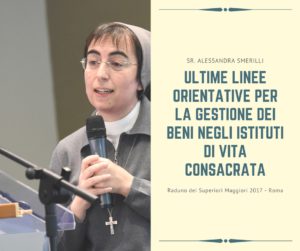 ‘To rethink financial administration requires specific skills and capacities, but it is a dynamic that concerns the life of each and every religious. It is not a task that can be delegated to someone: it involves the full responsibility of every person. Here, too, we are faced with an educational challenge that cannot leave consecrated people outside – a challenge that certainly involves above all financial administrators and those who are involved personally in the choices of an Institute. They are required to be as wary as serpents and as innocent as doves (cf. Mt 10:16). And Christian wariness enables us to distinguish between wolves and sheep, because there are so many wolves dressed as sheep, especially when money is involved!
‘To rethink financial administration requires specific skills and capacities, but it is a dynamic that concerns the life of each and every religious. It is not a task that can be delegated to someone: it involves the full responsibility of every person. Here, too, we are faced with an educational challenge that cannot leave consecrated people outside – a challenge that certainly involves above all financial administrators and those who are involved personally in the choices of an Institute. They are required to be as wary as serpents and as innocent as doves (cf. Mt 10:16). And Christian wariness enables us to distinguish between wolves and sheep, because there are so many wolves dressed as sheep, especially when money is involved!
One should not, then, be silent about the fact that Institutes of consecrated life themselves are not exempt from certain risks that I pointed out in the encyclical Laudato si’: ‘The principle of the maximization of profits, frequently isolated from other considerations, reflects a misunderstanding of the very concept of the economy’ (n. 195). How many consecrated people still today continue to think that economic laws are independent of all ethical considerations? How many times is an assessment of the transformation of a work or the sale of a property seen solely on the basis of an analysis of costs and benefits and of market value? May God deliver us from the spirit of functionalism and from falling into the trap of greed! In addition, we must educate ourselves in responsible austerity. It is not enough to have made a religious profession to be poor. It is not enough for me to entrench myself behind the statement that I possess nothing because I am a man or woman religious, if my Institute allows me to manage or enjoy all the possessions that I desire, and to control civil foundations erected to support works, thus avoiding the controls of the Church. The hypocrisy of consecrated people who live as rich people wounds the consciences of the faithful and injures the Church.
We should begin with little daily choices. Everyone is called to play their part, to use possessions to make choices involving solidarity, to take care of the creation, to measure themselves against the poverty of families who certainly live nearby. This is a matter of acquiring a habitus, a style marked by justice and sharing, of engaging in hard work – because often the opposite would be more comfortable – and of making honest choices, knowing that this is simply what we ought to do (cf. Lk 17:10)’.
Message of the Holy Father Francis to Participants in the Second International Symposium on the subject ‘Rethinking the Financial Administration of Institutes of Consecrated Life and Societies of Apostolic Life in Faithfulness to their Charisms’, 25-27 November 2016.



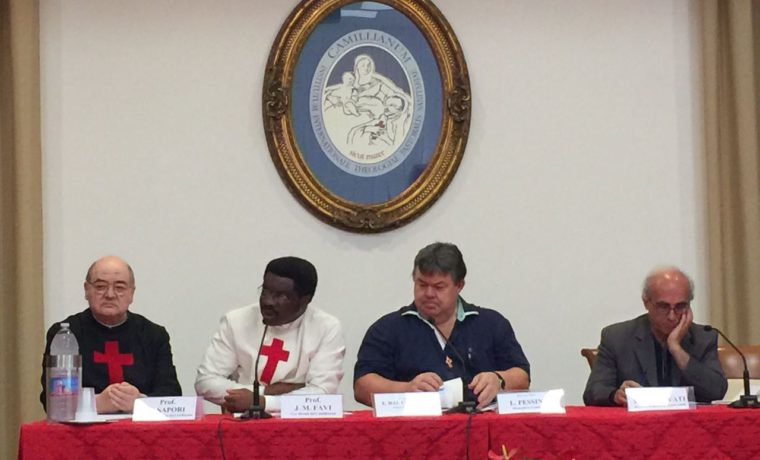
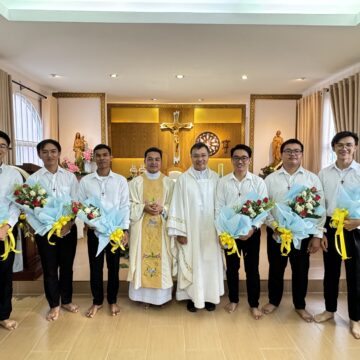
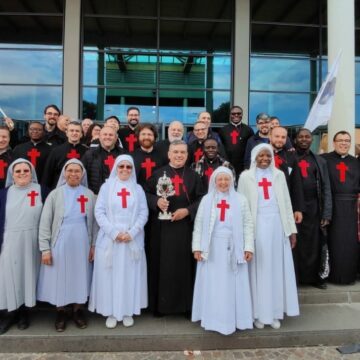
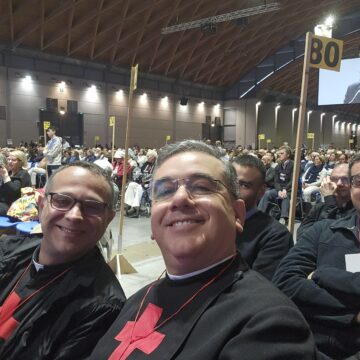
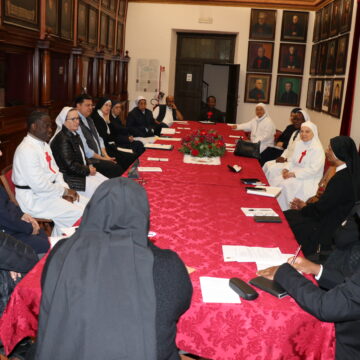








Camillians on Facebook
Camillians on Twitter
Camillians on Instagram